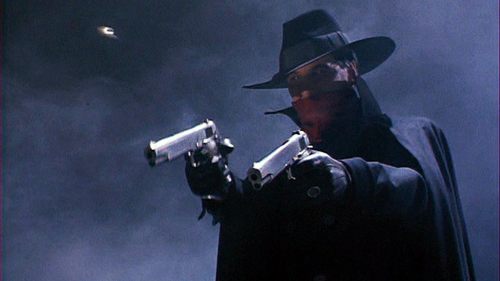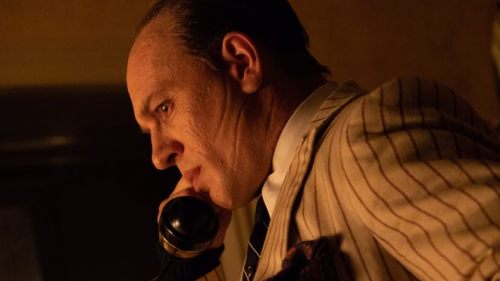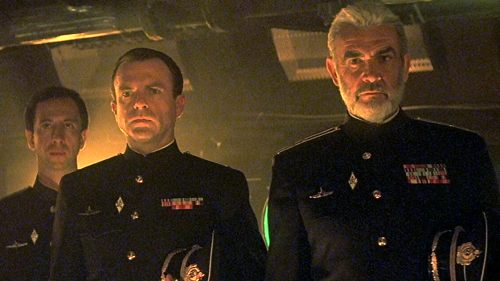Interview: Emilio Estevez Heads Back To The Library With THE PUBLIC
“It’s a David and Goliath story in many ways,” Emilio Estevez says about his latest film, The Public, in which a group of homeless people take over the Cincinnati library in search of shelter from the cold. While the act of civil disobedience inevitably sparks a media circus and a standoff with the police, the story's main focus is how libraries have become de facto homeless shelters, forcing librarians to adjust to playing the role of unqualified social workers and first responders. As writer, director, and star, it was clear when I sat down with Estevez at Alamo Winchester's Lost Weekend film festival that he’d spent a lot of time and energy bringing this story to life — twelve years to be exact. Now that he’s on tour promoting the film, often hosting screenings in libraries and homeless shelters, he’s observing firsthand how his work is connecting with the people he endeavored to portray. “This movie is about misfits, and outcasts, and marginalized people who don’t get movies made about them,” continues Estevez. “And they’re empowered. They see themselves as the Davids against the Goliaths.”
Given that most people know Emilio Estevez for his numerous portrayals of misfits and outcasts on screen, it seems logical he’d be drawn to a story that shines the spotlight on a group so often ignored or overlooked. The Public was inspired by an article written by Chip Ward for the Los Angeles Times in 2007. Building from the idea of a library acting as a sanctuary for the homeless, Estevez explains, “I started to imagine what it would look like if the patrons on a particularly cold night decided not to leave. What it would look like, how law enforcement would react, how politicians would react, how the media would spin it.” Although he never expected the project would take over a decade to complete, ultimately, he feels the story is more important now than ever. “Not that I’m saying I was prescient,” he states. “I was patient, if anything, and I think it’s more relevant now than it would’ve been had we made it ten years ago.” With the film opening in select theaters today, Estevez is hopeful all the starts and stops along the way happened for a reason. “God has other plans for you while you’re making yours.”
Despite the obstacles, things seem to have at least worked in his favor when it came to assembling his incredible cast. “I was surrounded by some really talented folks who came to the sandbox to play,” he says about the star-studded ensemble, including Jeffrey Wright, Michael Kenneth Williams, Alec Baldwin, Jena Malone, Taylor Schilling, and Christian Slater. Rounding out the cast himself as librarian Stuart Goodson, the choice to star in his films has become more of a time saver than anything. He jokes, “I don’t wanna have to wait for myself to come out of the trailer. I just wanna get it done. So, for me to go around chasing people, it’s just like, you know what, I got this, I’ll play this role.” Some of the film’s finer moments feature him sparring with Baldwin’s police detective, or butting heads with Slater’s politician. But the most resonant moment occurs between Stuart and Jeffrey Wright’s Anderson, when they discuss the power of words and literature, in turn, exposing the underlying connection between every human in the room. “You’re only as good as the people you surround yourself with,” he adds, “and I’m surrounded by an extraordinary group.”
Estevez has been writing, directing, and starring in his own stories since the eighties, from the early days of Wisdom (1986) and Men at Work (1990) to more recent and resonant dramas, Bobby (2006) and The Way (2010). He notes, “The work that I’m doing now, and the films I’ve been doing, really for the last twenty years, have been a little more grounded.” Still, that doesn’t mean he’s disconnected from some of his more iconic roles from the past. In fact, he admits he couldn’t resist throwing a couple Easter eggs into The Public as a reference to that other film he made in a library over thirty years ago. “I wear the blue jacket that’s not dissimilar from the letterman’s jacket in The Breakfast Club,” he tells me. “There’s also a scene where a librarian is reading to a bunch of children and the book she’s reading, She Was Nice to Mice, was written by Ally Sheedy when she was eleven-years-old.” So, even though he’s found his own voice as a filmmaker, it’s obvious he still has a lot of respect and appreciation for the roles and experiences that came before.
After The Way came out in 2010, thousands of people around the world were inspired to take the pilgrimage to Spain's Santiago de Compostela depicted in the film. When asked what his hopes would be if The Public were to garner a similar response, he declares, “For people to start parking their bias at the door when they see [someone] on the street. An act of kindness costs nothing, so, acknowledgment goes a long way.” He goes on to stress the importance of unconditional giving, which he illustrates in the film in a scene where his character offers Michael Kenneth Williams' Jackson some money, but not without suggesting he use it for food and a room for the night. “Once you make that donation,” Estevez asserts, “you can’t micromanage how it’s gonna be spent. It’s for whatever the person needs, because we don’t know.”
The experience of viewing the film in libraries across the country has not only provided librarians and homeless people with a representation of their daily lives they’d never seen before, it’s provided them with another tool to help raise awareness about the crisis at hand. At Lost Weekend alone, Estevez had the opportunity to meet with Brandon Thomas of the Winchester Rescue Mission and John Huddy of the Handley Regional Library System to discuss their plans for the future and best practices for encouraging others to make some noise about the issue of homelessness that is too often ignored. While it’s been a long journey and the story has evolved a lot since he first wrote it down in 2007, when it came down to it, Estevez recalls thinking, "What did I want to leave the audience with? The simple word is hope.”
Look for The Public in select theaters this weekend.



